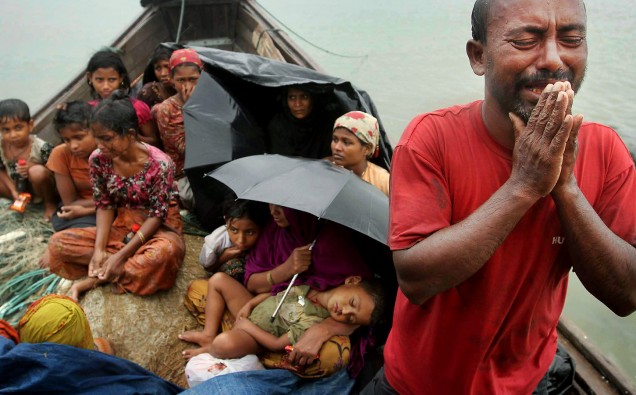There is no end to the continuing carnage in Myanmar. Over the past year or two, several independent international agencies and rights groups like Human Rights Watch (HRW) and Amnesty International have come out with numerous damning reports, detailing the state-sanctioned campaign of incredible savagery and chilling brutality against Rohingya Muslims. In partnership with Yale University and Aljazeera, the HRW published hundreds of spine-chilling first person accounts of Rohingya refugees, now in Bangladesh. They talked of mass killings, rapes and burning of homes and entire neighborhoods in the Rakhine state. The watchdog backed its report with satellite images showing the burning and destruction of entire Rohingya neighborhoods and villages.
Now the United Nations has come up with its most damning indictment of Myanmar. In a strongly-worded report this week, the world body said that the four-month long military crackdown in Rakhine has killed hundreds of Muslims. “The ‘area clearance operations’ have likely resulted in several hundred deaths,” said the report by the UN’s Human Rights Office, detailing horrific abuses against a people long rejected and demonized by Burmese society. The UN report, based on interviews with hundreds of refugees, said it’s “very likely” that crimes against humanity have been committed in Myanmar. Victims recounted appalling crimes and atrocities by the security forces or civilian fighters working alongside the military and police.
At least 47 percent of those interviewed by the UN said they had a family member who had been killed in the operation, while 43 percent reported being raped. Hundreds of Rohingya houses, schools, markets, shops, madrasas and mosques were burned by the army, police and sometimes civilian mobs, according to testimonies in the UN report. “Numerous testimonies confirmed that the army deliberately set fire to houses with families inside, and in other cases pushed Rohingya Muslims into already burning houses. In several cases, the army or villagers locked an entire family, including elderly and disabled people, inside a house and set it on fire, killing them all.” If anyone had any doubts about the complicity of Myanmar state in the systematic victimization and dehumanization of the Rohingya, this report with its clinical findings should remove them. All of this, of course, has not just happened with the blessings of Myanmar’s powerful military, but it has been chiefly responsible for these crimes against humanity. The question is, how long will they continue and who will stop them?
After Hitler’s genocidal campaign that nearly wiped out the Jews from across Europe, the world vowed to never let history repeat itself. It promised itself to “never again” remain silent in the face of genocide, ethnic cleansing and other crimes against humanity. Indeed, one of the main reasons that the UN came into being was to prevent such crimes. Yet an indifferent world has allowed this commitment to be broken again and again. It’s the same chilling apathy coupled with helplessness that you see over the ethnic cleansing that Myanmar has been carrying out against its Muslims for the past many years. Indeed, according to Dr. Shaik Ubaid, who has been speaking out for the Rohingya for the past two decades as part of the US Burma Task Force, it may be the world’s longest running genocide. The community has been the target of the worst possible oppression and persecution at the hands of both the Buddhist majority and the junta. According to the UN, the Rohingya are easily the most persecuted religious minority in the world. They are denied citizenship, healthcare and education and their movements are heavily curbed. Many had hoped the situation would improve once the country embraced political reforms and democracy under Aung San Suu Kyi. Even the Rohingya, who have no right to vote and are not considered citizens, had hoped for her victory in the 2015 elections. Yet under this democratic dispensation, things have gone from bad to worse. The ongoing pogrom in Rakhine province, unleashed by the military in the name of fighting terror has led to unspeakable horrors for an utterly helpless people. The crackdown has been so overwhelming that thousands of terrified Rohingya have fled their homes. Nearly 100,000 have taken shelter in Bangladesh despite the fact that they are hardly welcome there. More than 120,000 Rohingya have been crammed into displacement camps since violence was unleashed by Buddhist mobs in 2012.
Yet the regime in Yangon lives in denial. The biggest disappointment in this unfolding catastrophe has been Suu Kyi and her party. We understood her silence over the persecution of Muslims under the junta. Today, when she is in power, her silence and inaction are not only indefensible; they are criminal.
In the words of UN rights chief Zeid Bin Ra’ad Al-Hussein, given the gravity of the issue, Myanmar demands “robust reaction” from the world community: “The Government of Myanmar must immediately halt these grave human rights violations against its own people and accept the responsibility to ensure that victims have access to justice, reparations and safety. The killing of people as they prayed, fished to feed their families or slept in their homes, the brutal beating of children as young as two – the perpetrators of these violations, and those who ordered them, must be held accountable. The US and EU, which demonstrated unseemly haste in lifting international sanctions on Myanmar, must push Suu Kyi to stop the genocide. The West as well as China and India have an immense amount of clout in Yangon. It’s time they used some of that influence to stop the carnage.
The goings-on in Myanmar have sparked helpless rage in the neighborhood, especially in Indonesia and Malaysia, where massive protests have been held. However, much of the Muslim world remains indifferent. This needs to change. A little nudge from 57 Muslim countries representing 1.7 billion people could rescue a million and a half lives. This could very well make the difference between life and death for the Rohingya.





















